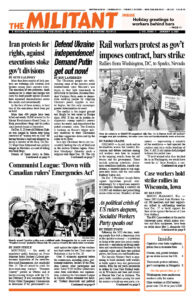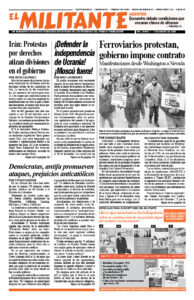For more than a week thousands of demonstrators, most of them young, have braved subzero temperatures to protest corruption in Ulaanbaatar, the capital of Mongolia. The demonstrations began Dec. 4 as prices for necessities have soared. This included a 40% jump in the price of coal used for heating, and after media reports said 385,000 tons of state-owned coal, worth an estimated $120 million, was unaccounted for between 2013 and 2019. The discrepancy was uncovered when Mongolian export data was compared with import data provided by China.
The protesters clashed with police Dec. 5 in front of the Government Palace at Genghis Khan Square where large crowds demanded officials come out and face the people.
“They seem to forget what they promised us,” a student who gave her name as Bayarmaa told the press, referring to government pledges after protests last April. “But they aren’t doing anything, taking our money, filling their own bellies.”
Two herders told the press they had traveled to the capital to join the protests. “Doing nothing is not right. I think it is right that young people are angry,” said Enkh Amidral, a father of three, who wants the government to “punish the thieves.” Some 60% of Mongolians — including thousands of herders — live in traditional tents, heated by coal-powered stoves.
“Come out, come out!” people shouted at the government building. “If the citizens rise up,” one sign said, “the feast is over!”
Demonstrators say they are determined to stay in the streets even after Erdenes Tavan Tolgoi, one of the country’s largest state-owned coal-mining firms, was put under government supervision and a handful of officials arrested. On Dec. 13 the government said it planned to list the mine for public sale, claiming this will drive out graft.
“We want the big fish,” Bayaraa Damiran said at one rally. “They arrested seven or eight officials who were on the bottom. We want to know the big fish at the top.”
For many the theft was the final straw. The country’s economy has been battered by rising fuel costs following Moscow’s invasion of Ukraine and the disruption of trade with China whose government closed its borders during the pandemic. These developments exacerbated the crippling inflation.
How could government officials “just be so calm when the citizens are buying bread by (the) slice, not by the loaf?” one protester told TenGer TV.
Wedged between Russia and China, Mongolia depended heavily on the Soviet Union until its collapse in 1991. Russia is still the sole source of electricity to Mongolia’s western region and the country gets 60% of its gasoline, liquid petroleum and diesel from Russia. So far the government has refused to take a definitive position on Moscow’s invasion of Ukraine, an issue that became more pressing as thousands of Russian men migrated there in October to avoid conscription.
Beijing, meanwhile, dominates Mongolia’s trade, with 86% of its exports going to China. Coal, which generates half of Mongolia’s export revenue, sells at about $70 per ton in Mongolia but brings $140 per ton in China. Capitalist social relations, unequal trade terms and lack of direct access to the sea, along with widespread corruption, mean one-third of the 3.5 million Mongolians live in poverty despite the country’s vast mineral wealth and coal deposits.

